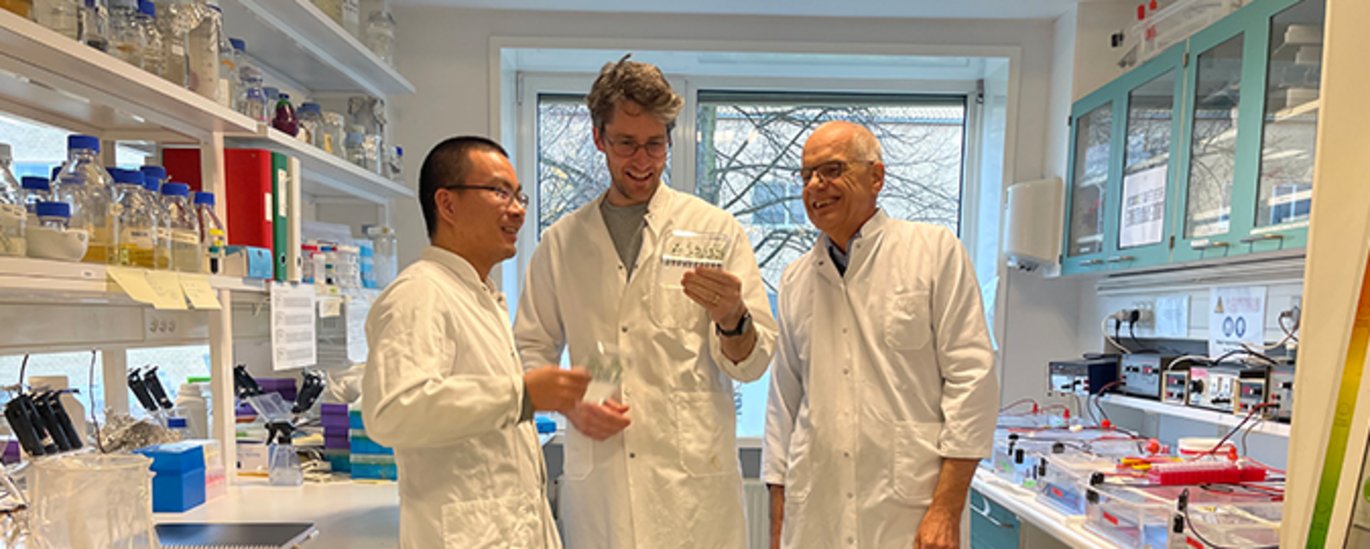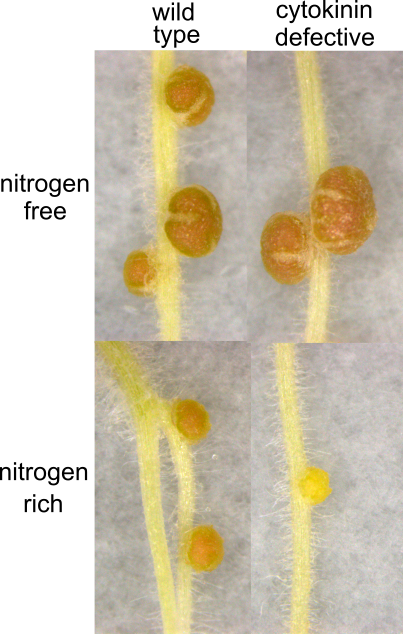Legume plants use hormones to balance nutrient sources
Researchers from Aarhus University have led a team that has discovered one of the ways legume plants balance nitrogen acquisition from the soil with that from their bacterial symbionts. The work identifies regulation of a key plant hormone, cytokinin, as central to this balance. These new results will aid in developing legumes with improved nitrogen fixation and a possible reduction in the use of fertilisers.


Legume plants can form symbiosis with soil bacteria (Rhizobia) that fix atmospheric nitrogen and deliver it to the host plant through specialised root structures, called nodules. The plant invests some energy in this process, and has therefore evolved mechanisms to restrict the symbiosis, if nitrogen is abundant in the soil. In the study now published in the international journal Nature Communications, the researchers show how regulation of the plant hormone cytokinin is central to this balance.
- "We found that synthesis of the plant hormone cytokinin is critical to integrate external nitrogen availability and rhizobia derived nitrogen into nodule development", says Jieshun Lin, the lead author of the paper. "In this way, legumes restrict formation of nodules and preferentially acquire nitrogen from soil. The connection between nitrate and cytokinin has previously been found in other species, however we found this connection is altered in legumes, where cytokinin is also central to the development of the nodule,” concludes Jieshun.
The research group at Aarhus University is part of the large international ENSA (Engineering Nitrogen Symbiosis for Africa) consortium that explores whether the symbiotic nitrogen fixation in legumes can be engineered and introduced into crops to support a low input and sustainable agriculture.
- "From this work we now have a greater understanding of the intricate roles of plant hormones in this important developmental process. Our future perspective is to try and use this knowledge to help engineer a nodule-like organ on cereal roots, as one step towards transferring nitrogen-fixing symbiosis into other plant species", says Dugald Reid. “The knowledge will also be important for improving sustainability of legume cultivation, for example by ensuring legumes maintain high levels of nitrogen fixation in all field conditions.”
Link to the article in Nature Communications
Nitrate restricts nodule organogenesis through inhibition of cytokinin biosynthesis in Lotus japonicus
Jieshun Lin, Yuda Purwana Roswanjaya, Wouter Kohlen, Jens Stougaard & Dugald Reid
DOI: 10.1038/s41467-021-26820-9
More information
Postdoc Jieshun Lin
Department of Molecular Biology and Genetics
Aarhus University, Denmark
jslin@mbg.au.dk - +4587154935
Assistant Professor Dugald Reid
Department of Molecular Biology and Genetics
Aarhus University, Denmark
dugald@mbg.au.dk - +87154935
Additional information
We strive to ensure that all our articles live up to the Danish universities' principles for good research communication (scroll down to find the English version on the web-site). Because of this the article will be supplemented with the following information:
Type of study: Experiment
External collaborators: Laboratory for Molecular Biology, Wageningen University, Nederlands and Centre of Technology for Agricultural Production, Agency for the Assessment and Application of Technology (BPPT), Jakarta, Indonesia.
External funding: This work was funded by the project Engineering Nitrogen Symbiosis for Africa (ENSA) currently supported through a grant to the University of Cambridge by the Bill & Melinda Gates Foundation and UK government’s Department for International Development (DFID). Analysis by Y.R. and W.K. is supported by Netherlands Organization for Scientific Research (VENI863.15.010).
Conflict of interest: None.
